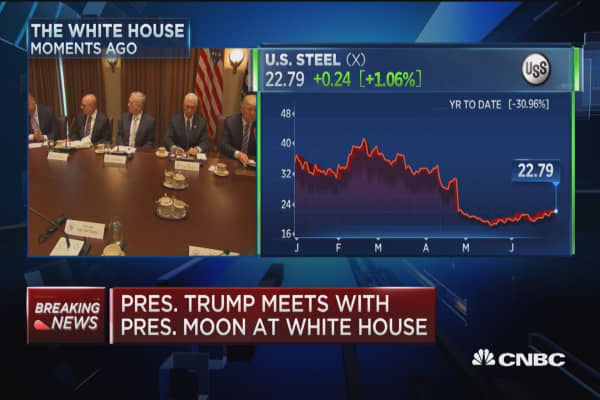By Huileng Tan
The Trump administration ratcheted up its criticism of China in a report released by the White House on Tuesday detailing its claims of economic aggression by the Asian giant.
The 35-page report titled "How China's Economic Aggression Threatens the Technologies and Intellectual Property of the United States and the World" came a day after President Donald Trump threatened to slap additional tariffs on goods from China, setting off market turmoil.
China "has experienced rapid economic growth to become the world's second largest economy while modernizing its industrial base and moving up the global value chain. However, much of this growth has been achieved through aggressive acts, policies, and practices that fall outside of global norms and rules (collectively, 'economic aggression')," the White House report said in its opening.
It goes on to describe practices through which China "seeks to access the crown jewels of American technology and intellectual property."
Chinese acts of economic aggression include physical and cyber-enabled theft of technologies and intellectual property, evading U.S. export control laws, counterfeiting, piracy and reverse engineering.
Of note, the report also says that Beijing seeks to manipulate or pressure any of the more than 300,000 Chinese nationals annually attending U.S. universities or working at important American institutions.
The White House said those Chinese nationals become "non-traditional information collectors that serve Beijing's military and strategic ambitions."
The report also lists a "wide range of coercive and intrusive regulatory gambits to force the transfer of foreign technologies and [intellectual property] to Chinese competitors, in exchange for access to the vast Chinese market."
The report also lists a "wide range of coercive and intrusive regulatory gambits to force the transfer of foreign technologies and [intellectual property] to Chinese competitors, in exchange for access to the vast Chinese market."
Those policies include foreign ownership restrictions, strict administrative approvals and licensing requirements, discriminatory patent and other intellectual property rights restrictions.
"Given the size of China's economy, the demonstrable extent of its market-distorting policies, and China's stated intent to dominate the industries of the future, China's acts, policies, and practices of economic aggression now targeting the technologies and [intellectual property] of the world threaten not only the U.S. economy but also the global innovation system as a whole," the report concluded.
The trade dispute between the world's two largest economies escalated after President Trump said in a statement late Monday that he had requested the United States Trade Representative to identify $200 billion worth of Chinese goods for additional tariffs at a rate of 10 percent.
"Given the size of China's economy, the demonstrable extent of its market-distorting policies, and China's stated intent to dominate the industries of the future, China's acts, policies, and practices of economic aggression now targeting the technologies and [intellectual property] of the world threaten not only the U.S. economy but also the global innovation system as a whole," the report concluded.
The trade dispute between the world's two largest economies escalated after President Trump said in a statement late Monday that he had requested the United States Trade Representative to identify $200 billion worth of Chinese goods for additional tariffs at a rate of 10 percent.
Beijing responded by saying China will protect its interests and it is prepared to fight back.
That comes after the U.S. on Friday announced that it would impose a 25 percent tariff on up to $50 billion of Chinese products.
That comes after the U.S. on Friday announced that it would impose a 25 percent tariff on up to $50 billion of Chinese products.

